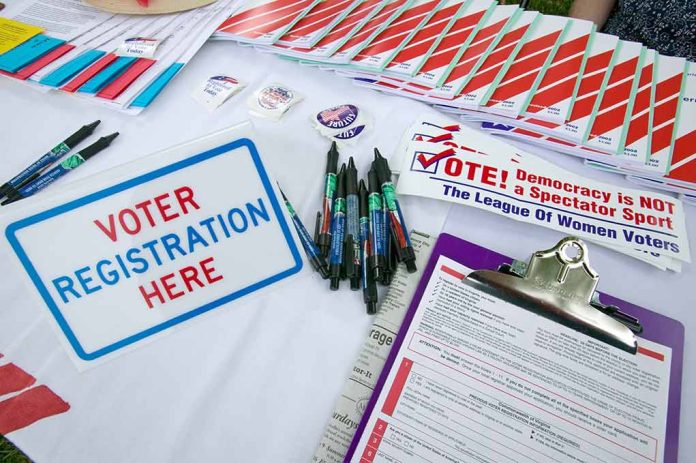
South Carolina ordered to release voter registration list to out-of-state group, raising questions about transparency and privacy in elections.
At a Glance
- Federal court orders South Carolina to provide voter registration list to Public Interest Legal Foundation (PILF)
- South Carolina is the fourth state required to disclose voter rolls to PILF
- Decision aligns with National Voter Registration Act of 1993 (NVRA) guidelines
- Ruling aims to enhance election integrity and transparency
Federal Court Mandates Voter Roll Access
A federal court has ordered South Carolina to make its voter registration list available to the Public Interest Legal Foundation (PILF), an out-of-state organization. U.S. District Court Judge Joseph Anderson ruled that the state’s voter list falls under the disclosure mandate of the National Voter Registration Act of 1993 (NVRA), which requires states to maintain and provide access to records from federal elections for at least two years.
The court’s decision overrides South Carolina’s previous restriction that limited access to in-state voters only. This ruling marks South Carolina as the fourth state to comply with such a request, following similar cases won by PILF in Maine, Maryland, and Illinois.
Legal Basis and Implications
The court’s decision is rooted in the Supremacy Clause of the U.S. Constitution, which states that federal laws take priority over conflicting state laws. PILF successfully argued that states cannot impose additional restrictions, such as residency requirements, on access to voter rolls under the NVRA.
The ruling is seen as a significant step towards maintaining electoral process integrity and bolstering public confidence in election outcomes. However, it also raises questions about voter privacy and the potential misuse of such data.
South Carolina’s Political Landscape
It’s worth noting that South Carolina’s governorship and both houses of the state Legislature are controlled by Republicans. The South Carolina Election Commission, a five-member board appointed by the governor, includes representation from both majority and minority parties. The current executive director, Howard Knapp, was a defendant in the PILF lawsuit.
Last week, we won access to South Carolina's voter Roll. This win brought TRANSPARENCY to the state's elections. https://t.co/J9DhTtj8Rm
— PublicInterestLegal (@PILFoundation) September 24, 2024
Potential Impact on Election Integrity
PILF claims to use voter rolls to identify issues such as double voting and deceased registrants. The organization states, “We have compiled the voter rolls from across the country into a database that allows us to know who is voting twice or from beyond the grave.”
“We’ve used this data to sue states for failing to do effective list maintenance such as not removing deceased registrants, duplicate voter registrations, and voters who move to another state.”, PILF said.
While PILF’s efforts aim to enhance election integrity, it’s important to note that many of their claims about mass voter fraud remain unproven. However, these claims contribute to ongoing debates about the security and accuracy of the election process.
Looking Ahead
As South Carolina prepares to implement this court order, the state will need to balance transparency requirements with voter privacy concerns. The decision may also influence other states facing similar legal challenges regarding voter roll access. As the 2024 elections approach, the impact of this ruling on election administration and public trust in the electoral process will be closely watched by both supporters and critics of expanded voter roll access.







